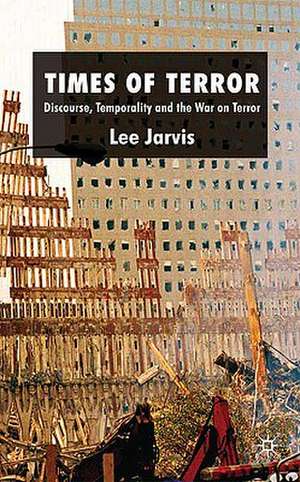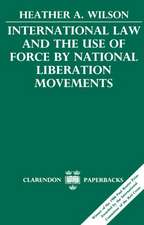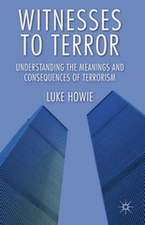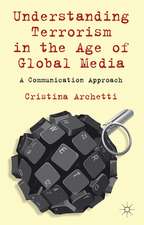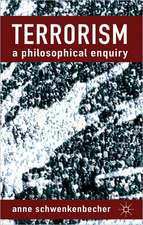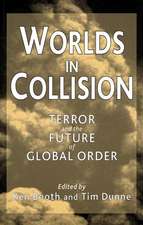Times of Terror: Discourse, Temporality and the War on Terror
Autor Lee Jarvisen Limba Engleză Hardback – 8 iul 2009
| Toate formatele și edițiile | Preț | Express |
|---|---|---|
| Paperback (1) | 381.00 lei 6-8 săpt. | |
| Palgrave Macmillan UK – 8 iul 2009 | 381.00 lei 6-8 săpt. | |
| Hardback (1) | 386.39 lei 6-8 săpt. | |
| Palgrave Macmillan UK – 8 iul 2009 | 386.39 lei 6-8 săpt. |
Preț: 386.39 lei
Nou
Puncte Express: 580
Preț estimativ în valută:
73.94€ • 76.73$ • 61.80£
73.94€ • 76.73$ • 61.80£
Carte tipărită la comandă
Livrare economică 17-31 martie
Preluare comenzi: 021 569.72.76
Specificații
ISBN-13: 9780230223691
ISBN-10: 0230223699
Pagini: 201
Ilustrații: IX, 201 p.
Dimensiuni: 152 x 229 x 18 mm
Greutate: 0.38 kg
Ediția:2009
Editura: Palgrave Macmillan UK
Colecția Palgrave Macmillan
Locul publicării:London, United Kingdom
ISBN-10: 0230223699
Pagini: 201
Ilustrații: IX, 201 p.
Dimensiuni: 152 x 229 x 18 mm
Greutate: 0.38 kg
Ediția:2009
Editura: Palgrave Macmillan UK
Colecția Palgrave Macmillan
Locul publicării:London, United Kingdom
Cuprins
Preface Introduction Making Time, Shaping Time Writing Radical Discontinuity Writing Linear Times Writing Timelessness Time, Violence, Identity, Politics Bibiography List of Sources Index
Recenzii
'Drawing on a wealth of primary research material and developing a sophisticated theoretical account of the relationship between security, identity, temporality and the political, Jarvis makes a convincing case for the central role of representations of time in the US Government's 'war on terror' discourse.' -Matt McDonald, University of Warwick, UK
'In a theoretically sophisticated, richly textured and incisive analysis, Times of Terror eloquently deconstructs the origins, dynamics and consequences of the current politics of terror. In a masterful critical discourse analysis, Lee Jarvis excavates the relationships between temporality, violence, identity, and the political in the language of political leaders, forcing us to rethink our understanding of the practices through which these values are enacted and performed in contemporary political life. This is a superb example of the new critical terrorism studies approach to the study of terrorism and counter-terrorism. It deserves the widest possible audience.' - Dr Richard Jackson, Department of International Politics, Aberystwyth University, UK
'The reader is left persuaded of the need to pay far more attention to how the temporal nature of discourse affects the practice and processes of international politics.' - Laura McLeod, Political Studies Review
'Jarvis' highly detailed, and at times dense, book is a perfect text not just for scholars and students of critical terrorism studies, but for'mainstream' terrorism studies as well, because it forces the audience to come to terms with how the rhetoric of terrorism can be extremely damaging.' Caron E. Gentry, Millennium - Journal of International Studies
'Times of Terror is a theoretically sophisticated and well researched monograph. This research not only adds value to current literature in critical terrorism studies, but goes to the heart of how the Bush administration narrated the war on terror. In this regard, by focusing on the manner in which time was represented, Jarvis has struck upon a vital dynamic of what he refers to as the war on terror discourse. This disguishes this monograph's research from othes that have taken a discursive approach to analysing the war on terror...' Oz Hussan, Critical Studies on Terrorism
'...it provides an interesting perspective on not only the concept of temporality, but also on how intertextuality is created from these source texts and how the framings identified in the analysis were then picked up by the media. However, its main contribution to the analysis of political discourse about the War on Terror lies in the philosophical sophistication of its central argument and in the attention to detail that is brought forth through the temporal dichotomies that are identified in the discursive construction of events.' -Discourse & Communication
'In a theoretically sophisticated, richly textured and incisive analysis, Times of Terror eloquently deconstructs the origins, dynamics and consequences of the current politics of terror. In a masterful critical discourse analysis, Lee Jarvis excavates the relationships between temporality, violence, identity, and the political in the language of political leaders, forcing us to rethink our understanding of the practices through which these values are enacted and performed in contemporary political life. This is a superb example of the new critical terrorism studies approach to the study of terrorism and counter-terrorism. It deserves the widest possible audience.' - Dr Richard Jackson, Department of International Politics, Aberystwyth University, UK
'The reader is left persuaded of the need to pay far more attention to how the temporal nature of discourse affects the practice and processes of international politics.' - Laura McLeod, Political Studies Review
'Jarvis' highly detailed, and at times dense, book is a perfect text not just for scholars and students of critical terrorism studies, but for'mainstream' terrorism studies as well, because it forces the audience to come to terms with how the rhetoric of terrorism can be extremely damaging.' Caron E. Gentry, Millennium - Journal of International Studies
'Times of Terror is a theoretically sophisticated and well researched monograph. This research not only adds value to current literature in critical terrorism studies, but goes to the heart of how the Bush administration narrated the war on terror. In this regard, by focusing on the manner in which time was represented, Jarvis has struck upon a vital dynamic of what he refers to as the war on terror discourse. This disguishes this monograph's research from othes that have taken a discursive approach to analysing the war on terror...' Oz Hussan, Critical Studies on Terrorism
'...it provides an interesting perspective on not only the concept of temporality, but also on how intertextuality is created from these source texts and how the framings identified in the analysis were then picked up by the media. However, its main contribution to the analysis of political discourse about the War on Terror lies in the philosophical sophistication of its central argument and in the attention to detail that is brought forth through the temporal dichotomies that are identified in the discursive construction of events.' -Discourse & Communication
Notă biografică
Lee Jarvis is a Senior Lecturer in International Security at the University of East Anglia, UK. He has articles published in a range of top journals including Security Dialogue, Political Studies, Millennium, and International Relations. He is author of Times of Terror: Discourse, Temporality and the War on Terror , and co-author of Terrorism: A Critical Introduction . The latter was awarded a 2012 Choice Outstanding Academic Title award.
